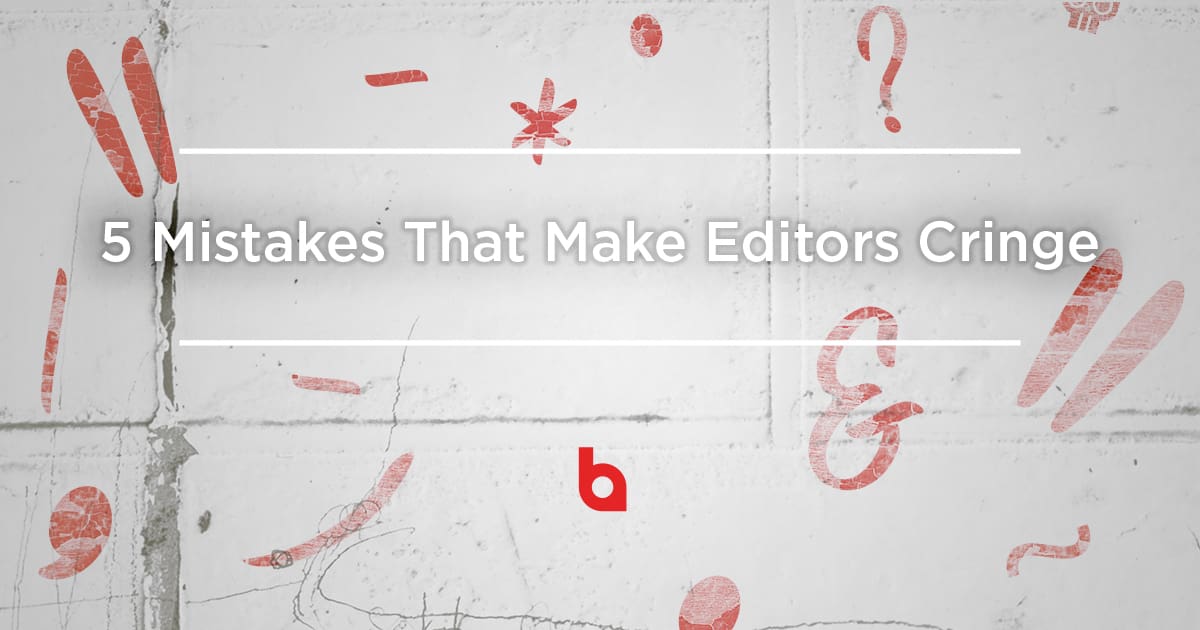
One of my heroes of late is a total mystery man — in my mind, anyway, an unnamed angel of the apostrophe. The U.K. resident, a self-proclaimed “grammar vigilante,” takes to the streets of Bristol under the cover of darkness to eliminate problematic punctuation on signs throughout the city. Among other editorial exploits, he uses his “apostrophiser” — basically, a broomstick outfitted with the sponges, paintbrushes and stickers needed to correct hard-to-reach overhead errors — to eliminate cringeworthy apostrophes when they’re not needed, and add them in when they’re painfully absent.
While few of us go to such lengths to correct the everyday errors that annoy us, all editors have their pet peeves — misspellings and grammatical goofs that just drive us crazy. And, while I may not have an apostrophiser, I do have the internet and the opportunity to share my thoughts on this blog. So, without further ado (and beyond the erroneous apostrophes mentioned above), here are my five biggest grievances related to punctuation, grammar, word choice, etc. — obviously, none of them should ever find a regrettable home in your marketing content:
- You’re, your/it’s, its/they’re, their (and sometimes there)
A meme I’ve seen for this one is good for a giggle (at least among word nerds): “When comforting a grammar Nazi, I always say softly, ‘There, their, they’re.’”
The easiest way to keep these straight is to remember that the apostrophes here represent missing letters — a tip-off that these words are contractions, and each represents a pair of words (“you are,” “it is,” “they are”). The second word listed in each of these sets (your, its, their) indicates possession/ownership. Lastly, “there” usually refers to a location.
- MIA commas
This is another one with a meme worth sharing: “Let’s eat, Grandma. Let’s eat Grandma. Punctuation saves lives!”
The former of these is a friendly invitation for a beloved family member to join you for a meal. The version without the comma is (to say the least) frowned upon in civilized society, and may well have once been uttered by desperate members of the Donner Party.
Let’s also take this opportunity to give props to the Oxford comma, which (despite being shunned by Associated Press style) can provide much-needed clarity on occasion. Yet another amusing example from the internet:
My heroes are my parents, Superman and Wonder Woman. Use the extra comma — keep it real.
(Without the comma, the writer could be interpreted as claiming a powerful yet far-fetched lineage.)
- Lack of parallel structure in lists
When creating a list, it’s easy to let this one slip. The idea here is that all items in your list need to be structured in the same way. All the items in the list should be complete sentences, or they should all be fragments; they should all be nouns, or they should all be verbs — the choice is yours, just keep things consistent.
For example, the baseball entry in this list is just a bit outside:
My favorite hobbies include:
– reading
– baseball
– collecting stamps.
… while in this one, it’s in the middle of the strike zone:
My favorite hobbies include:
– reading
– playing baseball
– collecting stamps.
- Misplaced modifiers
When a word or phrase is used to describe something, it should land next to the something it’s describing. For example, taken literally, the misplaced modifier in this sentence: Having just finished my meal, the waitress asked if I’d like to order dessert.
… would give you good reason to withhold this waitress’ tip — considering that she just ate your dinner. To clean things up, the sentence should be restructured to make it clear that you’re the one who ate the meal. Here’s one of a number of ways this could be done:
When I finished my meal, the waitress asked if I’d like to order dessert.
- Overuse of exclamation points
This one speaks for itself! For the love of God, be sparing with your exclamation points — otherwise, they start to lose their effect! And the time when it’s appropriate to use multiple exclamation points at the end of a sentence — never!!
- And a few more for good measure
“Should of” — just don’t. The correct word here is “should’ve.” Irregardless — not a word. “Hot water heater” — the “hot” part is redundant; drop it, and you’re referring to the same appliance.
Have your own grammar-cringe moments? Tweet them to us @brandonagency.
In need of some help with your brand? Contact us today — we can help!
By subscribing to our newsletter, you agree to our Privacy Policy.




